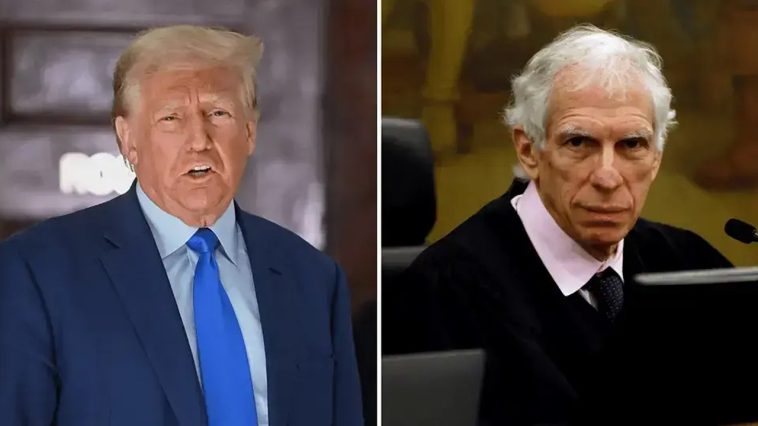LISTEN HERE:
Internationally respected law consultant Michael Conway, previously serving on the House Judiciary Committee, is advising an esteemed New York Judge, Arthur Engoron, to be cautious with his expressions and conduct during the ongoing trial of ex-President Donald Trump.
This case, a $250 million civil fraud lawsuit involving Trump, is often compared to the infamous ‘Chicago 7’ trial. Conway references this similarity to emphasize that it may be a deliberate strategy by Trump to agitate Engoron in a similar fashion as the defendants did to Judge Julius Hoffman in the ‘Chicago 7’ case, as there already appears to be evidence to support the plaintiff’s fraud claim.
Writing for NBC’s sister news organization MSNBC, Conway observed that Engoron frequently butts heads with not only Trump’s legal squad but also the former president himself. He raised the point that the staunch language utilized by Engoron isn’t necessarily an issue if its use can be justified, but in escalating the situation, there are potential risks.
Prominent among these is the possibility of an appellate court questioning his judgement, fueled by assertions from Trump’s counsel asserting judicial bias evident from the judge’s strong commentary.
Engoron’s responses in the New York courtroom were robust when reviewing Trump’s legal strategies, describing them as ‘plain sophistry’, ‘laughable’, ‘spurious arguments’, and ‘severe’ in his summary judgement.
He went so far as to sanction five of Trump’s attorneys with fines of $7,500 apiece on account of the ‘borderline frivolous’ points made in their briefs. Conway highlighted such instances in his article.
Conway underscored that Engoron might be responding excessively to the incessant grievances raised by Trump’s attorneys.
He stressed the need for Engoron to show restraint so as not to provide any grounds to the New York Appellate court to reverse his judgement. Part of this restraint includes not responding to any incendiary remarks from Trump or his legal team’s attempts at incitement.
During the trial, an application for a mistrial was lodged by Trump’s team, citing Engoron’s confrontational manner and use of particular language. Showing his commitment to fairness, Engoron rejected the claim. Trump’s team leveled an accusation of implicit bias against the presiding judge and his chief law clerk, a claim which was swiftly declined by Judge Engoron.
A moment of conflict arose when Trump’s team questioned Allison Greenfield, Engoron’s chief law clerk, over her previous political donations to Democratic candidates.
Despite this pressure, Engoron steadfastly defended both her actions and his own. Addressing the accusations against Greenfield and himself, Engoron remained resolute that bias was not a factor influencing the proceedings.
The defense made a case for mistrial pointing towards Engoron’s connection with a high school newsletter due to his role as an editor. The Judge in a dignified response reminded about his professional integrity that remains unaffected by his associations outside the court.
He clearly asserted that his involvement with the contents of the newsletter doesn’t interfere with his professional obligations of presiding over the trial in a fair and impartial manner.
Engoron’s association with the newsletter started when he founded the Wheatley School Alumni Association in 2007. This became a focal point of discussions in several conservative quarters when pictures purportedly depicting the judge exercizing shirtless surfaced.
Responding to the controversy, Engoron maintained that he only adds an extract and a link when a former student (himself included) is mentioned in an online publication.
He further added that due to the noteworthy character of this lawsuit, he’s been featured in the newsletter related to this case. However, he was swift to clarify that he neither authored nor assisted in any entries that are the focus of the defendants, and that no sensible reader would arrive at such an assumption.
Coming to Greenfield, the defense had pointed out her ‘partisan donations’ which exceeded the ‘strict yearly limit’ of $500 to entities opposing Trump. Engoron dismissed the implications made by the defense that her attendance at political events sponsored by certain organizations should infer that all activities and stances taken by the organizations be attributed to her, and by extension, to him.
The defense drew attention to Greenfield’s ‘unprecedented role’ in the trial, suggesting that Engoron frequently pauses to consult her before ruling on most matters. They noted that Greenfield also passed on real-time written notes to the judge which appeared as if she was co-judging. However, these claims were countered as well, emphasizing the importance of collaborative justice without any indication of partiality.


